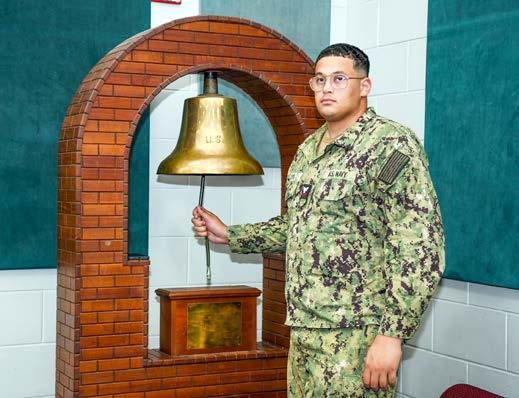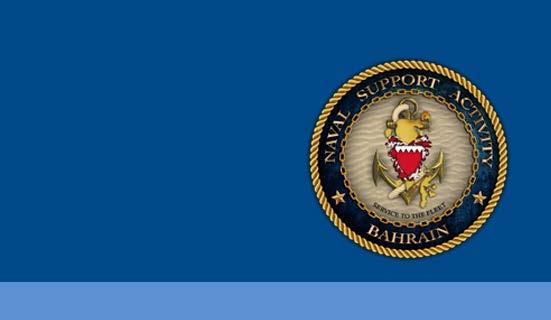

NSA Bahrain Pins 15 New Chief Petty Officers
Story by Mass Communication Specialist 1st Class Shayla Hamilton
MANAMA, Bahrain— Fifteen Sailors from eight commands were pinned to chief petty officer during a ceremony onboard Naval Support Activity (NSA) Bahrain, Sept. 26.
Family members, friends, and shipmates watched as Sailors from NSA Bahrain, Naval Supply Systems Command Fleet Logistics Center (NAVSUP FLC) Bahrain, Aircraft Intermediate Maintenance Detachment Bahrain, Navy Medicine Readiness and Training Unit Bahrain, Naval Criminal Investigative Service Bahrain, Regional Support Center Bahrain, Region Legal Service Officer Europe Detachment Bahrain, and Navy Munitions Command Atlantic Detachment Bahrain, donned gold-fouled anchors and combination covers during the time-honored tradition of the chief petty officer pinning ceremony.
Over the course of six weeks, Sailors selected for E-7 are tried and tested during a training and enculturation process formally known as “CPO Initiation.” The pinning ceremony is the culmination and conclusion of the initiation process, signifying the selectee’s entrance into the chief petty officers’ mess.
“E-7 is merely an enlisted pay grade you were selected for. Achieving the title of chief is something you must earn,” said Command Master Chief Karl Critides, NSA Bahrain’s command master chief. “Day one was not on August 20 – day one is actually today – and every day moving forward as a chief will be harder than the last. You will deal with new leadership challenges with our Sailors, higher expectations from our leaders, and new adversaries from across the globe trying to disrupt freedom and our way of life. Now, more than ever, we need influential, humble, trustworthy chiefs who set the standard daily and prove they are of the highest character.”


Command Master Chief Robinson, NAVSUP FLC Bahrain’s command master chief, served as the guest speaker for the event. During her remarks, Robinson addressed class 131, emphasizing their new role as the chief and the responsibility it carries.
“You are now the chief,” said Robinson. “You are the problem solver who makes sound decisions because you are wise enough to lean on your mess mates. You are the deck plate leader who is hands on, walking about your spaces every day to ensure that you remain visible and involved in the growth and development of everyone around you. The khaki uniform is synonymous with leadership. Those who wear it hold authority and responsibility. It reinforces and reminds us of those who paved the way. I will leave you with this: Lead with your heart, lead with conviction, remain humble and always remember, every Sailor deserves



a good chief petty officer.”
The rank of chief petty officer was established in 1893. Today, chiefs are regarded for their technical expertise within their ratings, superior administrative abilities, and strong leadership abilities. Chiefs serve as both supervisors and advocates for their Sailors, bridging the gap between the Navy's officer and enlisted personnel.
“From the earliest days of our Navy, chief petty officers have been at the forefront, guiding our Sailors through calm seas and turbulent waters alike,” said Capt. Zachariah Aperauch, NSA Bahrain’s commanding officer. “They’ve been the ones who stepped up when duty called; who led when leadership was most needed, and who ensured our Navy remained the best in the world.”
Aperauch explained that chief petty officers have made a tremendous impact throughout our Navy’s history, and


that same impact resonates within the Chiefs Mess aboard NSA Bahrain today.
“To our Chiefs Mess, I see the work you do each and every day,” said Aperauch. “You don’t just guide, you inspire. You don’t just lead, you set the standard. From mentoring junior Sailors to supporting the command, your impact reverberates throughout the Navy. Every Sailor, every officer, every admiral; each of us has been shaped by the presence of a chief.”
NSA Bahrain’s mission is to support U.S. and coalition maritime operations throughout the U.S. 5th Fleet area of operations by providing security for ships, aircraft and tenants on board NSA Bahrain and assigned detachments. NSA Bahrain provides efficient and effective shore services to sustain the fleet, enable the fighter and support the family with honor, courage and commitment.

Bahrain Proclaims Sept. 30 as Suicide Prevention Awareness Day
NSA Bahrain Proclaims Sept. 30 as Suicide Prevention Awareness Day

Story by MC1 Shayla D. Hamilton, NSA Bahrain Public Affairs
MANAMA, Bahrain— Capt. Zachariah Aperauch, commanding officer, Naval Support Activity (NSA) Bahrain, proclaimed Sept. 30 as Suicide Prevention Awareness Day at a ceremony onboard the installation.
Observed in September each year, Suicide Prevention Month raises awareness through sharing resources that assist in recognizing the warning signs of suicide, and how to get help.
The ceremony, hosted by the NSA Bahrain Suicide Prevention Team, featured remarks from base leadership and the presentation of facts about suicide, including statistics from across the Department of Defense, protective and risk factors for suicide.
“Protective factors are resources and aspects of our lives that promote healthy stress navigation and good coping skills… living a good and healthy life and helping others live a good and healthy life,” said Lt. E. J. Prevoznak, one of NSA Bahrain’s chaplains. “Self-care is an essential component of good health and can be taught as a set of survival skills. Risk factors are complex and consist of a chain of events. One thing affects the next. So, how can we be a disruptor in that chain of events? Annual case studies consistently reveal that suicide risk is higher when Sailors are experiencing multiple stressors including transitions, relationship issues, and career or personal setbacks. How can we be a friend to our fellow Sailors? How can we break the cycle of loneliness? That is why we’re here today.”



Aperauch delivered remarks highlighting the power of connection, the importance of building a command climate of trust, and seeking help when needed.
“This is not just another event on the calendar; this is a moment for us to come together as a Navy family to look out for one another, and to talk about something that impacts every one of us,” said Aperauch. “It’s easy in the hustle of our daily lives to feel like we’re carrying our burdens alone, but I want you to know that you are never alone – not in this Navy and not in our Bahrain family. We wear the uniform because we believe in something bigger than ourselves. We believe in service, in sacrifice, in standing shoulder to shoulder with our shipmates no matter the storm. Part of that commitment, part of being there for each other, means being willing to have the
tough conversations, to reach out when we see someone struggling, to ask the hard questions, and to let our brothers and sisters know that it’s okay not to be okay.”
Command Master Chief Karl Critides, NSA Bahrain’s command master chief, emphasized that acknowledging and addressing mental health struggles is just as critical as any other aspect of personal well-being.
“If you injure your arm or foot, most reasonable people would quickly seek medical attention at a hospital or primary care facility,” said Critides. “Someone with a broken leg has an injury that is easily visible to the public. However, when your heart and mind are injured, many people choose not to seek help. These are still injuries which cause pain, These are still injuries which cause pain. Ships,
submarines, and aircraft are built to withstand considerable damage, but people are different. We are fragile at times and must be treated accordingly. Service members are the backbone of our military. Without people, there would be no military or Navy, and our people go through hardships not often dealt with by the general public.”
Critides discussed the Navy’s mental health roadmap, which outlines the path of resources a Sailor can follow before the need for inpatient psychiatry treatment. Sailors have the option of peer-to-peer stress control resources such as expanded operational stress control, command chaplains, military and family life counseling services, life skills counseling through local Fleet and Family Support Centers, and more.
“One suicide is too many, and until the Navy averages zero per year, there is still work to be done,” said Critides. “Keep up the charge, and when times get tough reach out for help.”
If you think someone might be considering suicide, these five steps can help: Ask, be there, help keep them safe, help them connect, and follow up.
NSA Bahrain’s mission is to support U.S. and coalition maritime operations throughout the U.S. 5th Fleet area of operations by providing security for ships, aircraft and tenants on board NSA Bahrain and assigned detachments. NSA Bahrain provides efficient and effective shore services to sustain the fleet, enable the fighter and support the family with honor, courage and commitment.

Task Force 51/5, NAVCENT Complete Air MEDEVAC Drill with Bahrain Defense Force at King Hamad University Hospital
Press Release by 1st Lt. Michelle Lin, Task Force 51/5th Marine Expeditionary Brigade
MANAMA, Bahrain - On September 23, 2024, U.S. Naval Forces Central Command (NAVCENT) and Task Force 51/5th Marine Expeditionary Brigade conducted integrated air medical evacuation training with the Bahrain Defense Force Royal Medical Services (BDF RMS).
This training improved collaboration between the U.S. military and BDF regarding patient MEDEVAC and en-route care by establishing effective protocols for future real-world operations.
Comprised of Marines, Sailors, and BDF RMS personnel with civilian doctors and nurses, the team worked together on the roof of King Hamad University Hospital at a newly renovated landing zone constructed earlier this year. Helicopter Sea Combat Squadron (HSC) 26, part of Combined Task Force (CTF) 53, provided air transport, enabling the team to practice triaging, packing, and loading two simulated patients onto the helicopter. Following initial treatment, the team conducted communication drills focused on transferring patients to higher echelon of care.
“Using our air assets, we mitigate the need to deal with traffic and travel to the gate,” said U.S. Navy Lt. Freddie Mawanay, NAVCENT Director of U.S. Navy Global Health Engagement. “Before, we could not


access the tarmac where the plane lands. The newly established landing zone has drastically improved our processes and access to partner nation medical capabilities, ultimately increasing the survivability of casualties.”
Task Force 51/5 has conducted training events of similar size and scope with the BDF in the past to ensure regional security. This training was made possible with support from CTF-53’s HSC-26.
“We had a valuable opportunity to collaborate with King Hamad University Hospital and enhance our understanding of Bahrain's communication, transportation, and treatment plans for injured U.S. service members,” stated U.S. Navy Lt. Lauren Greenberg of HSC-26 and aircraft commander for the exercise. “We look forward to assisting with training for local personnel in the Kingdom of Bahrain.”
By the end of the drill, the team successfully established a sustainable MEDEVAC process for casualties, using BDF
medical support and ensuring interoperability with the Expeditionary Resuscitative Surgical Systems. This approach also demonstrated effective capabilities for ship-to-shore operations.

Energy Action Month: How Small Changes Make a Big Impact
Energy Action Month: How Small Changes Make a Big Impact
October is recognized as Energy Action Month, a time dedicated to promoting energy efficiency and conservation. Established by the US Department of Energy, this month encourages us to examine our energy use, understand its environmental impact, and make informed decisions to support a greener future. With the pressing issue of climate change, the commitment to Energy Awareness Month has never been greater
Why is the energy awareness important? Energy awareness is crucial for several
reasons:
a. Environmental Impact – Understanding how our energy consumption affects the environment can lead to more sustainable practices. By being aware, we can reduce our carbon footprint and combat climate change.
b. Cost savings – Awareness of energy usage can help us both at work and at home, this awareness can lead to
significant cost savings. Simple actions like turning off lights when not in use or using energy –efficient appliances can lower utility bills
c. Behavioral change – Real-time information on energy use can influence user behavior, leading to more efficient energy use and conservation. This in turn would lead to making educated choices about energy today and that would ensure that we leave behind a healthier planet for future generations. Here are some quick and easy energysaving tips you can incorporate into your daily routine:
a. Unplug Devices: Unplug chargers, electronics, and appliances when they’re not in use to avoid “phantom” energy consumption.
b. Use Energy-Efficient Bulbs: Replace incandescent bulbs with LED or CFL bulbs, which use less energy and last longer.
c. Adjust Thermostat: Set your thermostat a few degrees lower in winter and higher
in summer to save on heating and cooling costs (switch your thermostat to “auto”)
d. Seal Leaks: Use weather stripping or caulk to seal gaps around windows and doors to prevent heat loss.
e. Use Power Strips: Plug multiple devices into a power strip and turn it off when not in use to easily cut off power.
f. Wash with Cold Water: Use cold water for laundry whenever possible to save on water heating costs.
g. Optimize Fridge Settings: Keep your refrigerator at 37-40°F (3-4°C) and freezer at 0-5°F (-18 to -15°C) for optimal efficiency.
h. Take Shorter Showers: Reducing shower time can save both water and the energy used to heat it.
i. Use Natural Light: Bahrain is a location with ample sunlight through the year. Take advantage of natural daylight instead of artificial lighting during the day.
j. Maintain Appliances: Regularly clean and
maintain appliances like your HVAC system, refrigerator, and dryer to ensure they run efficiently.
In conclusion, Energy Action Month serves as a vital reminder of the importance of energy awareness and conservation. By taking proactive steps to reduce our energy consumption, we not only save money but also contribute to a healthier planet. Each small action, whether it’s switching to energy-efficient appliances, reducing waste or simply being mindful of our daily habits, adds up to make a significant impact. As we move forward as an installation, let’s continue to embrace sustainable practices and inspire others to do the same. Together we can create a more energy-efficient future for ourselves and for generations to come.
If you would like more information or want to discuss energy efficiency in your workspace, feel free to contact the Installation Energy Manager, Mr. Joel Mathew – joel.g.mathew2.ln@us.navy.mil
Task Force 51/5’s training with the host nation is vital to maintaining critical response capabilities in the U.S. Central Command area of operations for potential employment and real-world crisis reaction.

Contact NMCRS at 439-2914 or email bahrain@nmcrs.org for more details. Command Reps encouraged to hold a Uniform Drive within command and arrange for delivery. Volunteer hours will be recognized.

WANTED! Volunteers


NMCRS volunteers generously give their time to help assist Sailors, Marines, & their families when faced with financial crisis. Develop marketable skills to enhance your resume & give back to your military community!
Scan the QR Code to complete our Volunteer Interest Form
DSN: 439-2914 | BAHRAIN@NMCRS ORG NSA I: BUILDING 100, ROOM 130A


STANDING WATCH
Chaplain Ryan Williams, LCDR, USN, CHC



This month across the Navy we celebrate new Chiefs added to the Mess. When I think about Navy Chiefs, I also think about Staff NCOs and other vital mid-tier leaders in all branches of our Armed Forces who, “while some of us were asleep in our racks at night…and even before some of us were born…” stood the watch! (See the poem “The Watch”). In fact, most Sailors, Marines, Airmen, Coasties, Soldiers, and Guardians, learn very early in their careers that standing watch is a huge part of being in the profession of arms (no pun intended with arms and watches…��)
I think we are pretty clear on what it means to stand the watch in the military context, but what does it really mean to watch? Certainly, watching includes an intense focus and mindful “beholding” of something in our scope of awareness, but perhaps we could gain some additional insights by observing another aspect of watch…. In fact, what if we were to simply take note of that watch most of us wear on our wrists? It seems a basic wristwatch can teach us a few principles. WATCH what we can learn:
1) Consistency. Just as a watch consistently marks off the seconds of every minute of every hour, we can learn to be consistent in watching out for the wellbeing and total health of ourselves and those around us!
2) Transparency. Just as a functioning watch tells us the truth about time, we can also be transparent with those around us by being honest and living with honor.
3) Reliability. Just as we can rely on a functioning watch to give us the accurate time, we too can be reliable, putting forth our best efforts and choosing day in and day out to live in a way that breeds trust.
4) Forward Momentum. Just as the hands on the watch move forward, we too can learn to accept (be willing to learn from and adjust to) the past, live each second, minute and hour in the here-and-now as it presents itself, and move with momentum into the future with confidence.
I can guarantee that many of us will be standing watch this week—after all, it is part of what it means to be a member of the Armed Forces! So, this week as you stand your various watches, please consider what it means to watch: be CONSISTENT, be TRANSPARENT, be RELIABLE, and maintain FORWARD MOMENTUM. Have a very watchful and wonderful week!



Fire Alarms in
Apartment Buildings

Large apartment buildings are built to keep people safe from fire. Fire alarm systems detect smoke and fire. They will warn residents of danger.
KKK The fire alarm system has many parts that work together. Some of the parts are out of sight. In a fire, smoke detectors sense smoke and activate the fire alarm. Manual fire alarm boxes allow people to sound the alarm. When the fire alarm system activates it will warn residents of danger.
KKK Everyone in the building should know where to find the manual fire alarm boxes (alarm boxes on the wall with a pull bar). Most are found within five feet of an exit door.
KKK If there is a fire, pull the manual fire alarm box handle on your way out of the building.
KKK When the system senses smoke or fire, a loud horn or tone will sound. Everyone must know what this sound means and how to react.
KKK Leave the building right away if you hear the sound of a fire alarm. Stay outside at your meeting place until you are told the building is safe.
KKK Treat every fire alarm as an emergency. When the alarms sounds, get outside.
KKK Only use a manual fire alarm box if there is smoke or fire. Frequent false alarms are a problem. People might ignore the sound if they hear too many false alarms. False alarms also put firefighters at risk.
Escape 101
Know the locations of all exit stairs from your floor. If the nearest one is blocked by fire or smoke, you may have to use another exit.
If the fire alarm sounds feel the door before opening. If it is hot, use another way out. If it is cool, use this exit to leave.
Close all doors behind you as you leave. Take the key to your apartment in case you are not able to get out of the building.
If fire or smoke is blocking all exits, return or stay in your apartment. Keep the door closed. Cover cracks around the door with towels or tape. Call 9-1-1 and let the fire department know you are trapped. Signal from the window by waving a flashlight or light-colored cloth.
Meet with your landlord or building manager to learn about the fire safety features and plans in your building.
NSA Bahrain Fire Department
DSN: 439-7012


New MOVIES at the MWR Cinema



Beetlejuice Beetlejuice (PG-13) -
1h 45m
After a family tragedy, three generations of the Deetz family return home to Winter River. Still haunted by Beetlejuice, Lydia's life is turned upside down when her teenage daughter, Astrid, accidentally opens the portal to the Afterlife. | Cast: Michael Keaton, Winona Ryder, Catherine O’Hara
Deadpool & Wolverine (R) – 2h 8m
Deadpool is offered a place in the Marvel Cinematic Universe by the Time Variance Authority, but instead recruits a variant of Wolverine to save his universe from extinction. | Cast: Ryan Reynolds, Hugh Jackman, Emma Corrin


Alien: Romulus (PG-13) – 1h 59m
While scavenging the deep ends of a derelict space station, a group of young space colonists come face to face with the most terrifying life form in the universe. | Cast: Cailee Spaeny, David Johnson, Archie Renaux
Trap (PG-13) – 1h 45m
A father and his teen daughter attend a pop concert only to realize they've entered the center of a dark and sinister event. | Cast: Josh Hartnett, Ariel Donoghue, Saleka, Shyamalan




















































